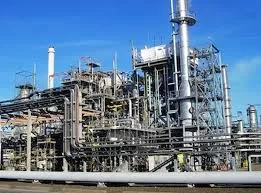
OUR MARKETERS PAID N1,045/LITRE FOR PH REFINERY’S PETROL, SAYS PETROAN
facebook sharing buttontwitter sharing buttonemail sharing buttonsharethis sharing buttonwhatsapp sharing button
The Petroleum Products Retail Outlets Owners Association of Nigeria (PETROAN) says a litre of premium motor spirit (PMS), also known as petrol, at the revamped old Port Harcourt refinery is N75 higher than the Dangote refinery product.
Joseph Obele, the association’s public relations officer, spoke on Tuesday during the official ceremony to mark the re-streaming of the refinery.
He said while marketers purchase petrol from the Dangote refinery at N970 per litre, NNPC’s price stands at N1,045 per litre — marking a difference of N75 per litre.
“Our marketers paid N1,045 for the petrol from Port Harcourt refinery,” Obele said.
He said the N75 price difference is a significant difference for companies, especially in a sector where competitive pricing is essential to profitability.
However, he said Mele Kyari, the group chief executive officer (GCEO) of the NNPC, has pledged to resolve the issue and harmonise prices to lessen the impact on marketers and consumers.
On November 26, the Port Harcourt refinery commenced crude oil processing after several years of non-functionality.
The state-owned refinery also commenced the loading of petroleum products for trucks.
“On Tuesday, trucks began loading petroleum products which include Premium Motor Spirit (PMS) or petrol, Automotive Gas Oil (AGO) or diesel and Household Kerosene (HHK) or Kerosene, while other product slates will be dispatched as well,” the NNPC had said.
In another statement, the NNPC said the Port Harcourt refinery is currently operating at 70 percent of its installed capacity.
The energy firm said it intends to increase operations to 90 percent of the refinery’s capacity.
Nigerian National Petroleum Company
Petroleum Products Retail Outlets Owners Association of Nigeria
 Premium News
Premium News